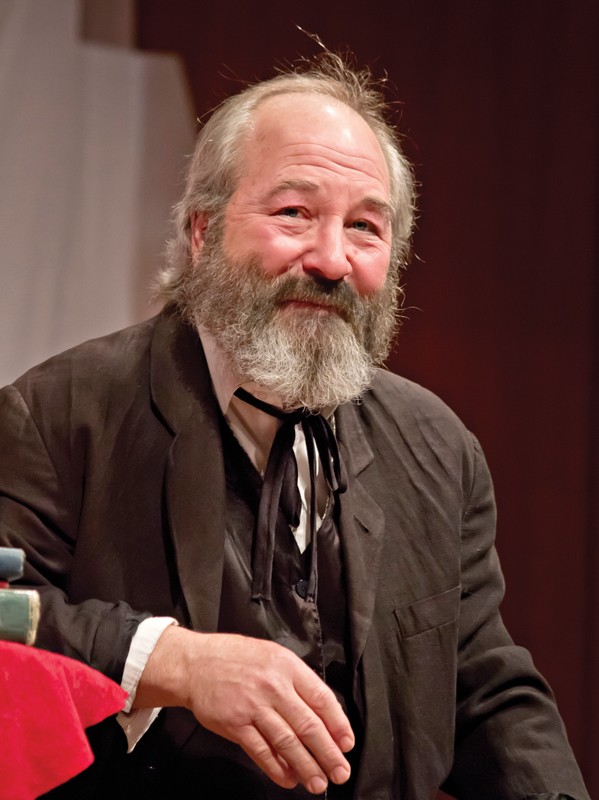One-man play entertains, educates on philosophical socialism

GVL / Amanda Greenwood The one-man play “Marx in Soho” with Bob Weick as Karl Marx. The show is Friday, March 22, 2013 at 7pm in the Cook-DeWitt Center.
Mar 27, 2013
When Bob Weick first saw the script for “Marx in Soho,” he knew the role would have a special meaning to him, especially with everything that was going on around the world at that time.
“You know, actually, I began to perform this role in 2004,” Weick said. “I had been an actor working professionally in Philadelphia for a number of years and one night an audience member stuck around after a show and handed me a copy of the script saying, ‘This would be perfect for you,’ and at the time, I really didn’t know much about Karl Marx, I didn’t even know that much about the author, Howard Zinn.”
His March 22 performance in the Cook-DeWitt Center at Grand Valley State University marked his 229th time portraying Karl Marx, a revolutionary 19th Century philosopher and socialist.
Between the time he received the script and when he actually began performing the one-man play, the U.S. was hit by a terrorist attack, leading to war, and Weick knew he wanted to do something about it.
“When the 2000 election happened and then when 9/11 happened, and then the rush to war in Iraq, I picked up that script and began to read it and I was trying to educate myself as much as anything about the issues of the world – what were the driving forces of society that make the world such a cruel and violent place for so many people?” Weick said. “And I felt this compelling urge to try to do something. To one, understand what was going on in the world, find some way to come to terms with that, and then to find a way where I could be involved and active and encourage people to enter into a discussion about, you know, the role of economics and capitalism in our society.”
So he picked up the script again, contacted the author, and asked for permission to perform it.
“And the rest is, as they say, history,” Weick said.
While Weick is able to talk about current events or issues in the play, he is also able to be creative with where he is at each venue stop.
“The play ‘Marx in Soho’ is essentially from the imaginings of Howard Zinn and how Karl Marx would perceive his visit to whatever city he visits, that’s how the play is,” said Joseph Verschaeve, affiliate professor of sociology at GVSU. “So Karl Marx arrives in Allendale, and he begins a dialogue with the people of Allendale.”
Verschaeve said the play is very relevant because many of Marx’s ideas are still seen in today’s society.
“The purpose of the play, then, is to help people to understand Marx’s perspective and to see how, perhaps, his understanding of the world could be relevant in today’s situation,” Verschaeve said.
While he performs the play at theatre companies, Weick said his main audience is college students because Marx usually comes up at some point in their studies.
“I have primarily marketed the play to college audiences because Karl Marx, as controversial of a figure that he is in some circles, he influences so many fields of academic studies, like sociology or physical science or economics, history,” Weick said.
Educating students is one of Weick’s goals when traveling to perform the play.
“Having a chance to talk to young people that are not as well versed in these ideas is really the main thrust of why I do what I do,” Weick said.
Larry Reynolds, emeritus professor of sociology at Central Michigan University, was part of a five-member panel, which took place after the performance. Each member was able to comment on the play, but because of time constraints, the question and answer portion was cut.
“I gave an overview of Marxian economics that are contained within the play, so what specific theory is, you know, being laid out in that play, which is incidental somewhat to the play itself,” Reynolds said. “So I just laid out the basis of Marx’s analysis that is laid out in the play.”
Reynolds was on the play’s panel last year, when it was performed on the Holland Campus and said he enjoyed sharing information because the performance raises “a lot of interesting issues and topics to be discussed.”
“College students generally, at some point in their education, have to confront what he has to say and his impact philosophically and economically,” Weick said. “So, it really is a help to teachers who are going to teach some aspect of Marx, and the play serves as a great companion piece, in that it helps introduce you to the man and to the basic terms of his philosophy.”
[email protected]






















